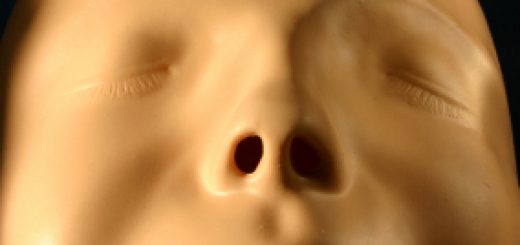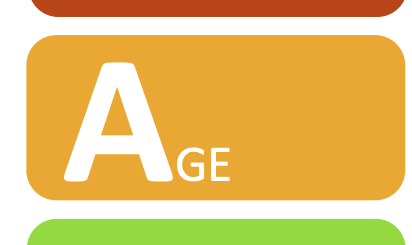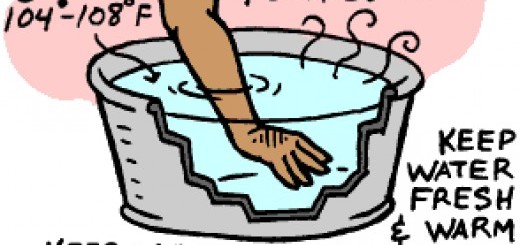First Aid for Chest Pain: 5 Effective Relief Tips
In the United States, over 6.5 million emergency department visits occur every year because of chest pain. Looking at this staggeringly high number, it’s imperative for us to know about the possible reasons for chest pain so that we can keep ourselves protected and also help others around us.
Chest pain is the pain or discomfort a person feels in any area of their chest. This particular pain can spread to different areas of a person’s upper body, such as into the jaw or neck and down the arms.
The pain one feels in their chest can either be dull or sharp, accompanied by an ache or tightness. The duration of it can vary, with some incidents lasting for just a few minutes and some staying for hours. In certain cases, the pain can remain for six months or even longer.
At times, chest pain gets better when the person is resting, and worsens when they exert themselves. It is also possible to experience chest pain while you’re at rest. Seeking medical attention with regard to chest pain is vital as it could often be life-threatening.
Do you wish to learn more about how chest pain occurs? In this article, we will be discussing the symptoms and causes of chest pain, the first aid involved in it, and how to prevent it.
Symptoms of Chest Pain
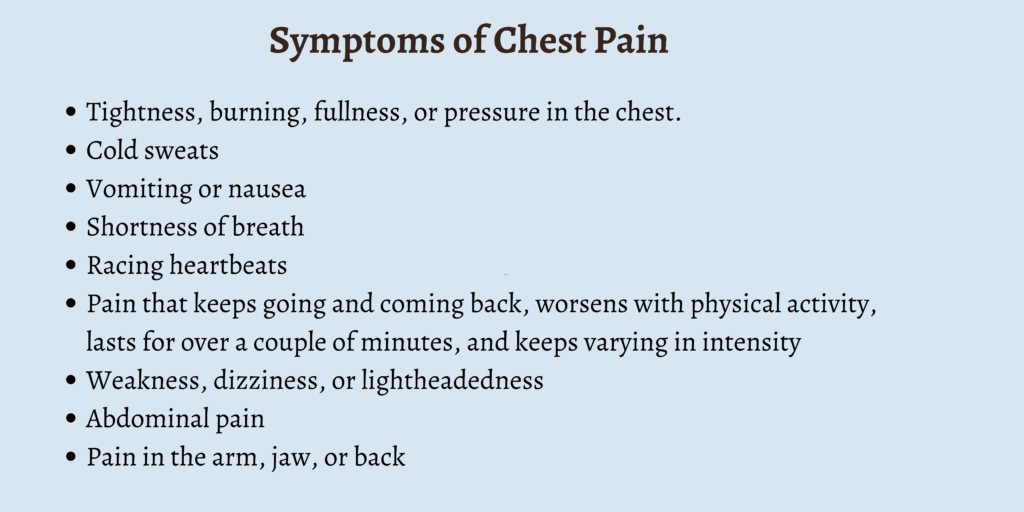
If the reason for your chest pain is related to your heart, then you could experience the following symptoms:
- Tightness, burning, fullness, or pressure in the chest.
- Cold sweats.
- Vomiting or nausea.
- Shortness of breath.
- Racing heartbeats.
- Pain that keeps going and coming back, worsens with physical activity, lasts for over a couple of minutes, and keeps varying in intensity.
- Weakness, dizziness, or lightheadedness.
- Abdominal pain
- Pain in the arm, jaw, or back.
In case the chest pain is not related to heart problems, the symptoms could be:
- Pain that remains for several hours.
- Pain that gets worse with coughing or breathing deeply.
- Trouble swallowing.
- Feeling tenderness on the chest when you push on it.
- Pain that gets worse or better with the change in body position
- Mouth feeling sour or the feeling that food is reentering the mouth
Causes of Chest Pain
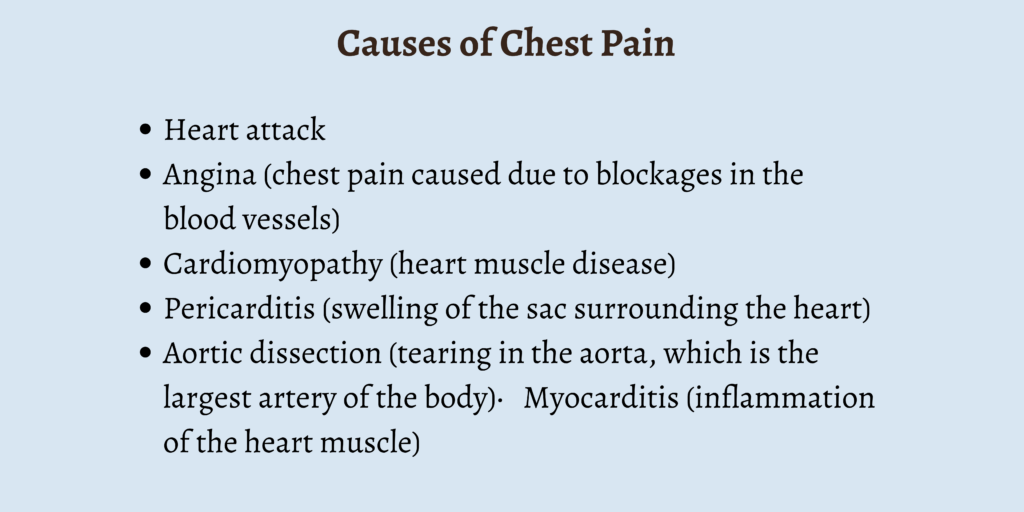
Numerous causes can lead to chest pain. While some are related to the heart, others are not. The causes of chest pain that are heart-related include:
- Heart attack
- Angina (chest pain caused due to blockages in the blood vessels)
- Cardiomyopathy (heart muscle disease)
- Pericarditis (swelling of the sac surrounding the heart)
- Aortic dissection (tearing in the aorta, which is the largest artery of the body)· Myocarditis (inflammation of the heart muscle)
There are gastrointestinal causes as well that could lead to chest pain, such as:
- Acid reflux
- Gallstones
- Issues with swallowing
- Pancreas or gallbladder getting inflated
The lungs can cause chest pain too, with the conditions being:
- Pneumonia (lung infection)
- Pneumothorax (collapsed lung)
- Pulmonary embolism (blood clot in the lung)
- Lung cancer
- Bronchospasm (tightening of the muscles lining the airways in the lungs)
Chest pain can be related to the bones or muscles as well:
- Broken or bruised ribs
- Compression fractures that lead to pressure on a nerve
- Sore muscles caused due to chronic pain syndromes or exertion
Apart from the causes listed above, shingles and panic attacks can induce chest pain in a person too. Shingles is a viral infection that triggers a painful rash.
First Aid for Chest Pain
If the chest pain that a person is experiencing is due to a heart attack, take the following steps as first aid:
- Call the emergency medical services right away. The symptoms of chest pain or heart attack should never be ignored. If the situation is such that medical help can’t get to you or can’t reach the premises soon, you will have to drive the patient to a medical facility yourself. If you’re the patient, driving yourself to a hospital should only be resorted to if there are no other options left.
- Take aspirin if a healthcare provider has recommended you do so. This particular medication aids in preventing blood clotting and taking it during a heart attack could reduce the severity of heart damage. However, don’t consume it if you haven’t been advised to take it by a medical professional. Also, don’t delay getting in touch with the emergency medical services to take an aspirin.
- If a healthcare professional had prescribed nitroglycerin to you previously, you can take it in the event of a heart attack. However, take it only as directed and remember to not take the nitroglycerin that has been prescribed to someone else.
- If the patient isn’t breathing or doesn’t have a pulse, begin CPR immediately. In case you don’t have CPR training, you can perform hands-only CPR. This means pushing on the person’s chest fast and hard about 100 to 120 times per minute. If you happen to be trained in CPR, then begin with 30 chest compressions and then proceed to giving two rescue breaths.
- If the victim is unconscious and there is an automated external defibrillator (AED) available, use it on them. This device helps in giving shocks to the heart so that the patient’s heart rhythm gets reset. These devices give a shock only when it’s appropriate to do so.
How to Prevent Chest Pain
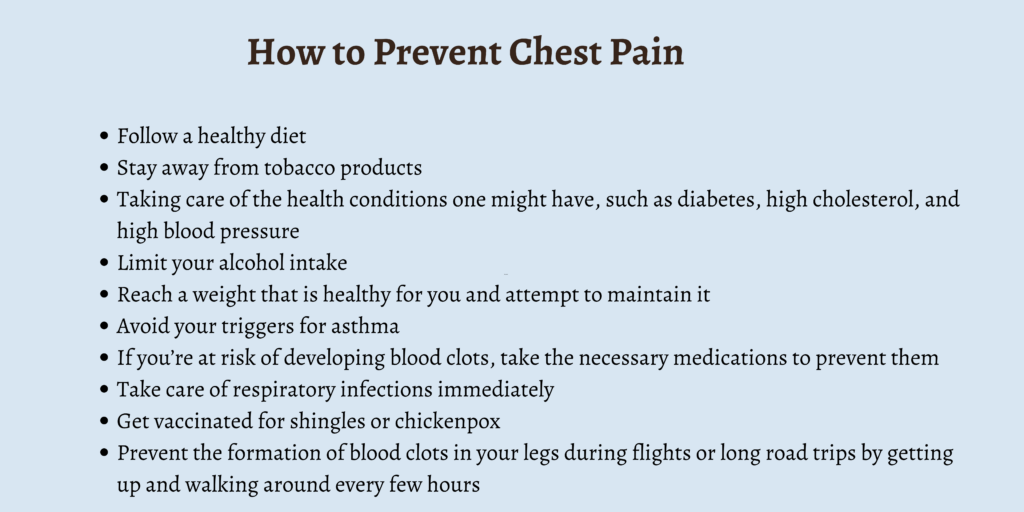
Following a healthy lifestyle is the only way to reduce the risk of experiencing heart and other diseases. Some of the ways to do so include:
- Follow a healthy diet.
- Exercise multiple times a week.
- Stay away from tobacco products.
- Taking care of the health conditions one might have, such as diabetes, high cholesterol, and high blood pressure.
- Limit your alcohol intake.
- Reach a weight that is healthy for you and attempt to maintain it.
The tips that can help you prevent other causes of chest pain that are not related to the heart are as follows:
- Avoid your triggers for asthma.
- If you’re at risk of developing blood clots, take the necessary medications to prevent them.
- Take care of respiratory infections immediately.
- Get vaccinated for shingles or chickenpox.
- Prevent the formation of blood clots in your legs during flights or long road trips by getting up and walking around every few hours.
FAQs
What are some of the common causes of chest pain?
Some of the common causes of chest pain include heart problems, panic attack, rib injury, muscle strain, and lung infection.
How do you know if chest pain is serious?
One way to know that a person’s chest pain is serious is if the pain is sudden and crushing or if it radiates into the left arm or jaw.
Can gas cause chest pain?
Gas pain can lead to stabbing pains and tightness in the chest.
Does stress cause chest pain?
Yes, stress, anxiety, and depression can often show up in the form of chronic chest pain.
Can high blood pressure cause chest pain?
Yes, high blood pressure can lead to chest pain.
Conclusion
If chest pain is caused by a common condition, it can be treated and resolved quite easily by a doctor. Some of the causes in this case could be asthma, anxiety attacks, and acid reflux.
However, often a life-threatening condition could be the reason for a person’s chest pain. In such a situation, medical help should be provided in case the patient is suffering from a heart attack or some other heart-related disease.
After the patient’s condition is diagnosed, a medical professional can then recommend the necessary treatment to manage their condition.

